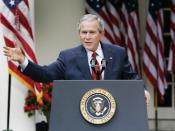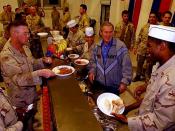Courrier Baptiste le 27/06/13
2ème année
American Politics, Trade and Foreign Policy
What was the role of the ideological thought on the decisions of George W. Bush's administration to attack Iraq?
Introduction
ë Wars of the 21st century and particularly Operation Iraqi Freedom, are wars of choice and not wars of necessity û wrote Dario Battistella, a French political scientist, in Peace and Wars in the 21st century (2011), like an echo to the work of Raymond Aron. He considers that the Iraqi War of 2003 couldn't be explained through causes that proceed from the international system and the repartition of power, but it is in the internal political machinery of the American State and more precisely in the circle of personalities revolving around Georges W. Bush that the decision making process must be analyzed as well as the perceptions and the personal beliefs of the American president: a realistic approach is, to a certain extent, pertinent, and particularly regarding economic interest but the realistic scope ignores the role of ideology and ideas (Morgenthau, 1948).
The Second Iraq War began in March 2003 through a joint intervention of the USA and United-Kingdom to end in July 2011 with the withdrawal of the latest American troops. The reasons traditionally mentioned justifying the intervention are the links between the regime of Saddam Hussein with al-Qaeda and the potential presence of weapons of mass destruction. Some contextual elements must be pointed out; firstly, this intervention takes place after the First Gulf War also led by United-Kingdom and the USA under Georges H. W. Bush, which poses the stake of the inherited beliefs of Georges Bush Jr. But this intervention was an answer to the violation of Kuwait's border and within the framework of an authorization of the Security Council of the United Nations,


